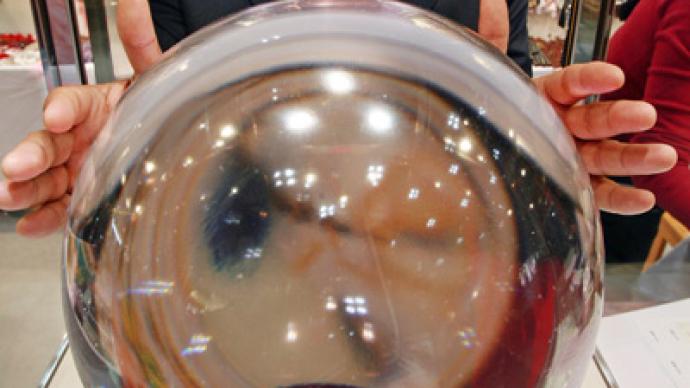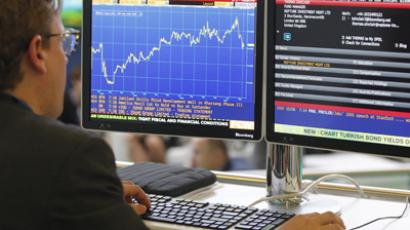2013: Lucky or unlucky for the world economy?

The Russian economy managed to live through a tough 2012 and could be among the fastest growing in Europe in 2013. It’s set to rise 3.5% - 4%, with Western Europe remaining a strong threat and a major long term reshape of the economic map looming.
Between Scylla and Charybdis
The year 2012 marked a difficult period for struggling Europe, which had been seeking to help almost hopeless economies such as Greece remain afloat and keep the currency union members together. Experts agree little progress should be expected in 2013, with Spain likely to follow Greece in pressing the Eurozone for bailout money in a so-called financial game of “chicken.” Italy and Portugal will be sitting on the sidelines, “slowly sinking under untenable amounts of debt,” as Margaret Bogenrief from ACM Partners put it. “The Eurozone is headed for deeper, more intense, and much less retractable trouble in 2013.There is no foreseeable way for the region to recover as it exists today in its current form,” she told Business RT.At the moment most of the western economies are stuck between two huge problems. On the one hand, they are weighed down by huge sovereign debt that needs to be cut. In Greece, for example, the debt to GDP ratio is expected to reach 190% in 2013, with the figure in Spain estimated at about 79% in 2012. Debt reducing austerity would be an answer, but right now, when a recession is looming, cutting spending or increasing taxes would produce a much harder impact on economic growth than in normal times, Ben Aris, editor-in-chief at Business New Europe, told Business RT.“These two goals [cutting debt and providing for economic growth] are mutually exclusive and the countries that will do best in 2013 are those that can negotiate their way between these rocks either one of which could sink the leaky boat of recovery,” he said.A big change is looming for the Eurozone in about 5-8 years, when the union will consist of about 5 – 7 central economies, including Germany and France, “while the others are discarded from the Union and, in turn, revert back to borderline 2nd tier economies no longer siphoning off funds from their highly industrialized neighbors currently keeping them solvent and alive,” Bogenrief projects. Looking eastwards, China is set to leave the US economy behind altogether, which remains just a matter of time. “The Roman Empire was the biggest economy in the world for centuries but once the decline and fall set in it became a less appealing place to invest or work. However, even if the standards of living in China (and Russia) are lower, the dynamism and opportunities on offer from a fast growing economy are what make a nation great and proud,” Ben Aris said.
Russia in the global context
Despite being on a slower growth track in 2012, with the growth rate much below its 6-8% average in the boom years, “Russia will be amongst the fastest growing economies in Europe in 2013,” according to Ben Aris. The 3.5% GDP growth the country produced in 2012 is Russia’s maximum potential at a time of difficult access to international debt markets and slack foreign direct investment, Aris added. “However, there is a chance that Russia will surprise on the up side if the reform program the Kremlin has put in place starts to deliver some successes. All this assumes that there is no financial train wreck in Western Europe, which is not impossible,” the expert concluded.“The Misha Bear” will indeed be unable to remain completely immune to the crises in the EU and the USA, Bogenrief agreed. That’s simply because the country is the third largest trading partner of the EU and the EU the biggest trading partner of Russia, the ACM Partners expert explained. However, remaining the world’s largest energy exporter, growing at a comparatively robust pace of nearly 4% in 2012 and having its public debt at about 9.6% of its GDP, when in some of European countries it’s above 100% of its annual gross domestic product, “Russia will truly emerge as a financial and political force to be reckoned with in 2013,” says Bogenrief.Ivan Tchakarov, the chief economist for Russia and CIS at Renaissance Capital, also joined the club of optimists, saying that given “a very modest positive GDP growth in Europe next year, or at least not another recession as in 2012… 2013 should be a better year for Russia.”With the oil prices expected to stand at about $110/bbl, and inflation at 7% in 2013, Russia is set to grow about 4% during the year, Renaissance Capital expert forecasts. The alternative estimation by Chris Weafer, chief strategist at Sberbank CIB, projects a more modest economic growth of 3.5% in 2013, with Urals crude standing at the average of $100/bbl and inflation being at about 6%.In any case, all major projections for the Russian economy developing in the future are based on robust oil prices, but the widely discussed and essential for Russia’s reverse from energy dependence has kicked off, says Weafer.“The contributors to economic growth since 2008 have mainly come from outside of extractive industries. So this trend is moving in the right direction and needs to be expanded at a faster pace before the threat of a fiscal and confidence crisis returns if, e.g. the price of oil was to collapse”The new points of growth for Russia could be in infrastructure, aviation or consumer services, believes Tchakarov. Other potential industries include agriculture, food and Pharmaceuticals as part of the drive to cut imports, as well as tourism and leisure, adds Weafer. Adding value to the final products in some extractive industries, rather than exporting the basic raw products is another huge growth potential for the Russian economy, the Sberbank CIB expert concluded.
Anastasiya Kostomarova, Business RT













